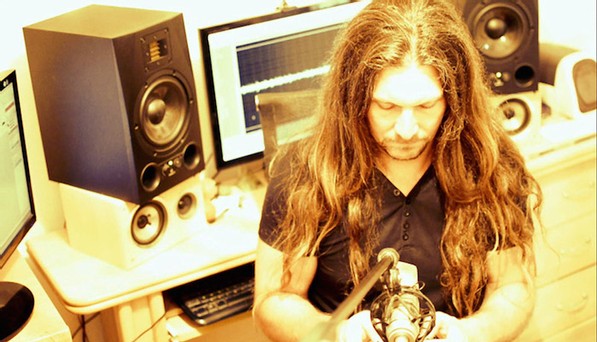
0mnivox est un compositeur éclectique, pop, electro, classique. Il joue avec tous les registres. Il nous vient d’Allemagne et l’interview sera donc en anglais.
Who is 0mnivox? Where are you from?
Born in Russia and currently living in Germany, Serge Eisen, alias 0mnivox, is an independent sound artist, multi-instrumentalist, composer and producer.
Why did you start to compose music? Can you live only with your music or do you have another job?
Music is my vocation. Before the age of 16 I had absolutely no relation to music. I was into drawing but not music. When I went to a high school of arts to develop my drawing skills there was also a faculty of music. Thus I was exposed to music that immediately became my new passion. There were lots of pianos in the school, and I was staying for long hours after classes exploring them and learning how to play, with occasional tips from the fellow students. Year after year, with constant practice, I was getting better and better and gradually the hobby turned into profession.
Nowadays I am a full-time musician who makes a living from creating production music. My works are featured in various large scale projects around the world including films, TV shows, advertisement campaigns of major corporations and numerous online projects of many kinds.
What drives you to compose music? There are two types of composition I make. The first one, which I call ART, is made for the sake of creativity, self expression and catharsis. This is a naturally occurring intrinsic urge through which my emotions, thoughts and ideas find their way out. I just grab a musical instrument and all the rest happens by itself. This type of composition comes directly from the heart and brings a lot of fun and gratification.The second type of composition, which is more restricting in terms of artistic expression, is CRAFT. This is when I put my talents and skills into practical use in order to provide for my family. I just research the current trends and demands of the stock music market and compose according to that. It’s merely a job. This type of creation is a product of the mind and has a little to do with self expression, except maybe in overall aesthetical approach.
From your point of view, what is your best success as a composer? Could you tell us a story that happened to you in a musical context?
The most succeeding composition of mine is the “Kalimba Solo For Lotus”. Lotus is my daughter’s name. When she was a baby, instead of bedtime stories, I used to play her improvised tunes on Kalimba (African thumb-piano), which was tuned in a unique way. One day I filmed a video of these tunes and uploaded to YouTube.
3 years later the video somehow went viral and received over 600,000 views just in one weekend. Currently it’s approaching to 3 million views and dubbed as “The most viewed Kalimba video ever”.
Due to its huge success, the world largest distributor of Kalimbas launched a new brand named after my daughter – “Lotus Kalimba” and pays me royalties from each sale for using my unique tuning. Different Kalimba manufacturers from all over the world send me their instruments just to get them featured in a video on my channel.
I suppose that success of this composition stems from its simplicity and sincerity. I didn’t try to impress anyone or achieve anything, there was no pretentiousness or ambition, just an unbiased and pure expression of genuine feelings to my little daughter.
Since music is a form of universal language that goes directly to the soul, many people could relate to the message of this composition, I believe.
This is a nice story, I like it.
What is your greatest wish as a composer?
I often wish that the general audience would have a better taste in music. Production music composers have to work in accordance with the market demand, and sadly, what the market demands leaves much to be desired.
In most cases the buyers don’t want original and artistic music, they just want something kitschy, something vulgar and trite that plays everywhere.
Therefore, many good composers, instead of making great music, find themselves mimicking those simplistic 3 chord tunes over and over again, because this is what the market demands.
The top charts songs are always so hackneyed and similar-sounding, while truly interesting and talented pieces of art remain unknown. Why did you choose to create music under Creative Commons or royalty-free licenses?
I don’t share special sentiments or ideology neither to CC nor to RF models. I started with them because they were the most immediate at that time to publish my music and allowed me to retain autonomy. It turned out to work pretty well for me, so I stayed.
What is your motto? Anything to say to conclude?
The problem in today’s music and other forms of arts is that everything as a copy of a copy. Artists are usually afraid of being original and just imitate other more successful artists, but they forget that those artists became successful because they were doing something that others did not. So, mimicking others won’t get you too far. You can reach certain degrees of success and have a pretty good career by mocking up others, but if you want to reach great heights, you have to be different, you have to be unique.
So,… dare to be different, and always do your best.
Thank you Serge. We wish you more successes like « Kalimba Solo for Lotus » and with ART compositions!
To listen to 0mnivox’s compositions on beMYsound, check his page on beMYsound ! And come back soon to see some of his videoclips.
